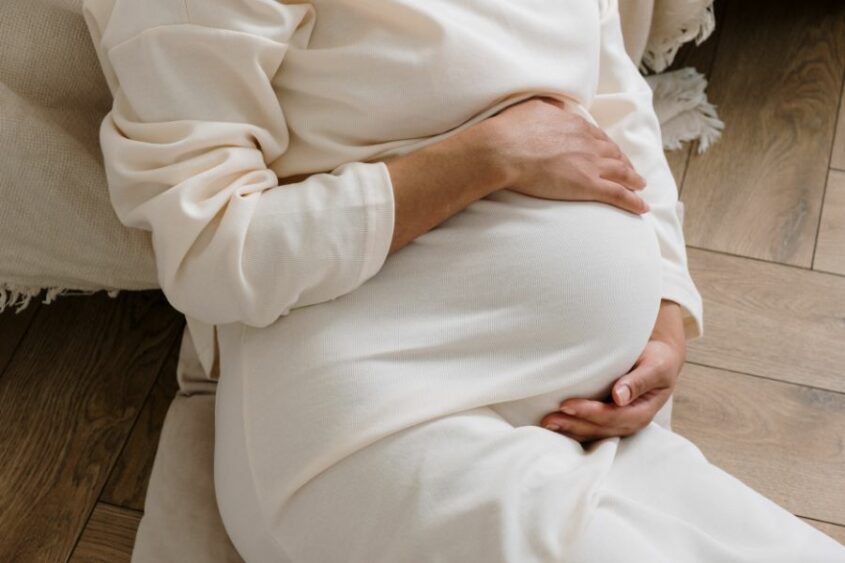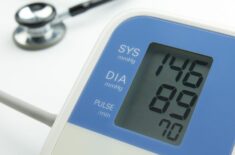Overview
A 2023 study published in the PNAS journal (or Proceedings of the National Academy of Sciences) found that a pregnant mother’s stress might directly impact her baby’s microbiome and mental health. (1)(2)
These surprising results leave you asking:
“How can my stress during pregnancy affect my baby?”
“What can happen to my baby if I’m stressed?
“How can I reduce stress to protect myself and my baby?”
A healthy, balanced microbiome promotes better metabolic function, helps develop your baby’s immune system, and can potentially have other future health benefits.
But how does a baby’s microbiome develop in utero?
And how do their gut bacteria continue to develop once they’re born?
Here’s the thing – you are the biggest factor in how your baby’s microbiome develops, mama.
The connection between you and your baby is strongest during pregnancy when your little one depends on you for everything.
They get all their essential nutrients, such as iron, calcium, iodine, vitamins (e.g., vitamin D), DHA and EPA (docosahexaenoic acid & eicosapentaenoic acid), and choline from you.
And while your baby ‘inherits’ gut bacteria on their way out of the birth canal (not while in your womb), the quality and kind of bacteria you’re passing to them can affect their life. (3)(4)
Considering how mom’s nutrient levels directly affect baby, it isn’t surprising that things like mom’s stress, anxiety, and trauma, also have an impact on your microbiome, might also affect them.
Keep reading to learn how that can happen.
Can Stress Disrupt The Microbiome?
Numerous studies have shown that stress can directly affect the microbiome.
In a 2020 study published in the Current Opinion in Behavioral Sciences journal, for example, researchers explain that there are several ways why this can happen: (5)
- “Stress eating,” described as consuming ‘hyper-palatable’ foods when undergoing psychological stress and depression, can influence which bacteria thrive in your gut.
- Gut imbalance can lead to higher numbers of bacterial species that can encourage dysregulated eating (more stress eating) or other harmful effects.
- Gut inflammation, increased stress hormone levels, and other changes in your gut system can also affect how these gut bacteria react. They’re likely to release toxins, metabolites, and other chemicals that can negatively affect our bodies.
- Gut imbalance or the release of these toxic chemicals can also increase anxiety or depression and affect stress responsiveness, worsening the situation.
How Does Maternal Microbiome & Mom’s Stress Affect The Fetus?
Studies have shown that babies likely get their first dose of gut bacteria from the birth canal. However, some are also looking into the possibility that vertical transfer can happen in utero (when the baby is still in the womb). (3)(4)
No matter where and when the exact transfer happens, however, it’s clear that there’s a direct connection between your gut microbes and your baby.
Researchers are still trying to find the direct effects of pregnancy stress on babies. However, several studies have already shown that it can lead to higher risks of the following problems: (6)(7)
- Preterm labor
- Miscarriage
- Complications from gestational diabetes or pregnancy diabetes
- High blood pressure, which can also lead to preeclampsia (a serious pregnancy complication) that can endanger the baby’s life
- Low birth weight (can lead to higher risks of type 2 diabetes, obesity, or heart disease later in life)
In a 2019 study in the journal Frontiers in Psychology, researchers explained that maternal anxiety or stress during pregnancy may have long-term effects on her baby, even up to adolescence. (8)
Infants whose mothers experienced stress during pregnancy are more likely to be more reactive to stressors than the control group (moms who weren’t exposed to more or unmanaged stress). (8)
The 2023 PNAS study mentioned above showed that alterations in a mom’s microbiome caused by “adversity” (e.g., chronic stress, traumatic situations, anxiety, etc.) can have a lasting impact on their child’s socioemotional functioning and mental health. (1)(2)
2023 Study Results: Mom’s Stress Possibly Affects The Baby’s Microbiome
Using research-analyzed data collected from a study of 450 dyads (pairs) of mothers and children in Singapore, the researchers focused on their experiences with “adversity exposure”: (1)(2)
- The mother’s experience with anxiety during pregnancy
- The mother’s mistreatment during her childhood (e.g., neglect, physical, sexual, or other forms of abuse)
- The child’s early exposure to any stressful life event (e.g., parents’ divorce or a grandparent’s death)
They also tested the gut microbiome composition of the moms and their children (at two years old). (1)(2)
The results were surprising.
Despite coming from different backgrounds, with diets not controlled in the study, the moms and children with “adversity exposure” had distinctly similar microbial patterns. (1)(2)
In turn, children exposed to anxiety in the womb and those who experienced stressful events also had distinct microbial signatures. (1)(2)
In particular, the gut bacteria Clostridium sensu stricto (considered an ‘inefficient producer’ of butyrate, an important anti-inflammatory compound) was more abundant in these “stress-exposed” children. (2)
The study also discovered that the gut bacteria Ruminococcus (considered a more efficient butyrate producer) was less abundant in these study subjects. (2)
Not only that, but data showed that these children also had: (2)
- Higher levels of Finegoldia and Streptococcus, which are microbes that can cause inflammation
- Lower levels of Parabacteroides and Intestinibacter, which are known as anti-inflammatory-associated microbes
The abundance of inflammation-causing microbes and the scarcity of their anti-inflammatory counterparts appear to affect these children’s emotional well-being and behavior. (1)(2)
According to the researchers, reduced Intestinibacter at two years old (the age of the study subjects) can increase the child’s risks for depression and anxiety at four years old. (2)
The study also found that the levels of the following gut bacteria in two-year-old children can lead to more sleep problems when they turn four: (2)
- Reduced levels of Lachnospiraceae UCG-008, Faecalibacterium, and Coprobacillus
- Higher levels of Veillonella and Blautia
Critical Response To The 2023 Study & Limitations
Even with the 2023 PNAS study’s breakthrough results, other researchers are skeptical about how these should be interpreted. (2)
Some of their reasons include the following:
Possible Failure To Establish The Pathway Of Gut Bacteria Transfer
Harvard T.H. Chan School of Public Health computational biology and bioinformatics professor Curtis Huttenhower admits that the study delves into “several important and provocative topics.” (2)
However, he pointed out that the authors weren’t able to establish how the moms passed on the adversity effects to their children’s microbiome. (2)
Too Much Diversity In The Studied Microbes
Huttenhower pointed out that the microbes mentioned in the study actually belong to diverse groups comprising multiple organisms, which can have different effects on the body. (2)
This means that the groups have many different organisms, instead of the researchers finding and studying specific gut bacteria species that might influence stress or anxiety. (2)
What Are The Factors Affecting Infant Gut Microbiota?
Huttenhower added that while babies receive gut bacteria from their moms, many other microbial sources should be considered. (2)
For example, babies can also get gut bacteria from their general surroundings, dads, or other family members. The presence of pets or siblings can also affect a baby’s gut microbiome. (2)(9)
Also, it’s important to note that infants and children can also get gut bacteria from their baby formula and food.
Plus, antibiotic usage and disruptions in the gut microbiome due to illnesses or diseases should also be considered. (2)(9)
Possibly “Weak” Correlations
Jotham Suez, an assistant professor at Johns Hopkins Bloomberg School of Public Health, cautions that the study’s correlations and effect size can be “weak.” (2)
Suez explained that though an altered microbiome can impact a child’s well-being and mental health, there isn’t any data that supports that in the 2023 PNAS study. (2)
Choice Of Study Subjects
Critics also pointed out that the study participants were Chinese, Malaysian, or Indian. (2)
Considering that different cultures have varied diets or methods of dealing with stress that can also influence their microbiome, the study’s results might be less applicable to other groups (e.g., Americans). (2)
Other Study Limitations
Aside from the reasons mentioned above, the study also had the following limitations: (2)
- The study relied on the mothers’ memories or recollections of early experiences (e.g., childhood trauma), which might be inconsistent or unreliable.
- The fathers’ influence on the children’s microbiome wasn’t tested.
- The children’s diets or food intakes weren’t measured.
It might be possible that the diversity and levels measured in the study could have been affected by any of these different factors. (2)
Impact & Usefulness Of The Study
Even with critical feedback against the study, the researchers believe that they’re on the right track in trying to find ways to help young children’s social and emotional development. (2)
Bridget Callaghan, the 2023 PNAS study’s senior author and an assistant professor for psychology at UCLA (University of California, Los Angeles), agrees that they relied on genus-level microbiome data (instead of specific gut bacteria species, as pointed out by Huttenhower). (2)
However, she defends the study, explaining that these microbial groups are known to play “some role” in inflammation or immune response. (2)
Callaghan and the other researchers recommended further research into the underlying mechanisms that cause the intergenerational transmission of mothers’ mental health risks to their children. (1)(2)
They also recommended studying the potential of using the gut microbiome as the target for intervention to reduce these risks. (1)(2)
9 Ways To Reduce Stress During Pregnancy
Some ways to reduce pregnancy stress:
- Eat well and choose healthy foods
- Keep yourself hydrated
- Get enough rest (we recommend deep sleep)
- Keep moving healthily and safely (e.g., prenatal yoga)
- Practice daily meditation
- Practice mindfulness and breathe consciously (e.g., belly breathing)
- Enjoy nature therapy
- Find your support group (e.g., trusted family members, social support networks, coaches, etc.)
- Use pregnancy-safe calming essential oils for stress relief (e.g., lavender oil, Roman chamomile oil, rose otto oil, bergamot oil, and jasmine oil)
MC-Approved Mama & Baby Probiotics:
Mama:
- Garden of Life – Dr. Formulated Probiotics Once Daily Prenatal – with Acidophilus and Bifidobacteria Probiotic Support
- Lovebug Prenatal Probiotic
- MaryRuth’s Prenatal Vitamins and Probiotics
- Jarrow Formulas Jarro-Dophilus Prenatal & Maternity Probiotics for Pregnant Women
- Pink Stork Prenatal Probiotics for Women, Vitamin Supplement
- Ritual Synbiotic+ : Probiotic, Prebiotic, Postbiotic, 3-in-1 Formula
- Thorne FloraPro-LP Probiotic – Acid-Resistant L. Plantarum Pearls
- Wellmade Mood Daily Probiotic
Baby:
- LoveBug Baby Probiotic Drops
- BioGaia Protectis Probiotic Drops
- Culturelle Baby Grow
- Gerber Good Start Soothe Comforting Probiotic Drops
- Garden of Life Baby Probiotics
For a more in-depth explanation of why we chose these top baby probiotics read this.
References
(1) https://www.pnas.org/doi/10.1073/pnas.2213768120
(2) https://www.washingtonpost.com/wellness/2023/08/24/stress-microbiome-intergenerational-trauma/
(3) https://www.ncbi.nlm.nih.gov/pmc/articles/PMC4464665/
(4) https://www.ncbi.nlm.nih.gov/pmc/articles/PMC5583026/
(5) https://www.ncbi.nlm.nih.gov/pmc/articles/PMC7213601/
(6) https://www.marchofdimes.org/find-support/topics/pregnancy/stress-and-pregnancy
(7) https://www.ohsu.edu/school-of-medicine/moore-institute/stress-and-placenta
(8) https://www.frontiersin.org/articles/10.3389/fpsyg.2019.02179/full
(9) https://www.ncbi.nlm.nih.gov/pmc/articles/PMC9441613/












